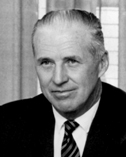

Norman E. Borlaug
Sasakawa Africa Association
March 25, 1914 - September 12, 2009
|
Scientific Discipline: Plant, Soil, and Microbial Sciences Membership Type:
Member/Public Welfare Medalist
(elected 1968)/(awarded 2002)
|
Norman E. Borlaug has commonly been called the father of the “Green Revolution” because of his tireless efforts, beginning in the early 1940s, to make Mexico self-sufficient in wheat production; and because of his subsequent saving of millions of people in India, Pakistan, and elsewhere from starvation through high-yielding wheat varieties. His science of wheat breeding, his ability to influence nations to commit to food production, and his training of large numbers of young people (he called them “hunger fighters”) who could follow in his footsteps, are recognized and appreciated around the world.
Born on a farm near Cresco, Iowa, Borlaug lived a long and active life up until his death at age 95. Even in his nineties he was still writing op-ed pieces, supporting population control, encouraging agricultural research and food production, and articulating the need for inputs such as fertilizer, water, seed, and capital. Borlaug received all three of his academic degrees from the University of Minnesota—a B.S. in forestry (1937) and an M.S. (1940) and Ph.D. (1942) from the Department of Plant Pathology with a minor in plant genetics. He was hired by Du Pont to work as a microbiologist in Wilmington, Delaware, but within two years he had found his true calling. Borlaug’s wheat research started in 1944 with a Rockefeller Foundation-sponsored program in Mexico. That program was transferred to the newly formed CIMMYT (the Spanish acronym for the International Center for Maize and Wheat Improvement). In his work at CIMMYT Borlaug developed high-yielding wheat varieties that, for example, were resistant to certain plant diseases, tolerant of many other important stresses, or were responsive to improved management methods or to a wide variety of environments.
Borlaug was one of only five people to have received all three of the following awards during their lifetimes: the Nobel Peace Prize (1970); the Presidential Medal of Freedom (1977); and the Congressional Gold Medal (2007), which is the highest award that the U.S. government can bestow on a civilian. (The other four were Mother Teresa, Martin Luther King, Nelson Mandela, and Elie Weisel.)

